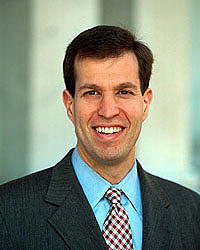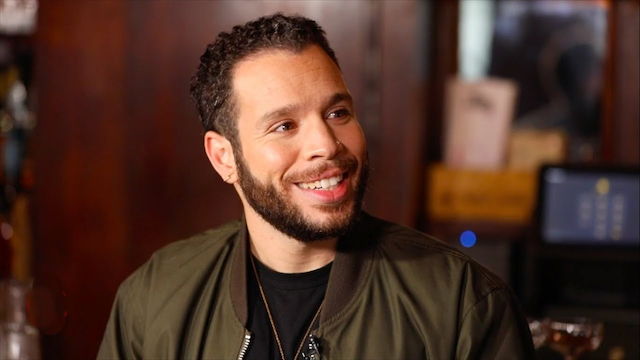|
presents THIS DAY IN GAY HISTORY based on: The White Crane Institute's 'Gay Wisdom', Gay Birthdays, Gay For Today, Famous GLBT, glbt-Gay Encylopedia, Today in Gay History, Wikipedia, and more …
Collected by Ted August 21 [{(o)}]|[{(o)}]|[{(o)}]|[{(o)}]| [{(o)}]|[{(o)}]
1872 – Aubrey Beardsley (d.1898), born in Brighton to a genteel but nearly destitute family , was a musical and artistic prodigy as a child who went on in his short life to become a highly original and influential illustrator, one of the greatest of the Symbolists. He was educated at the Bristol Grammar School and later, with the encouragement of Pre-Raphaelite painter Sir Edward Burne-Jones, attended night classes at the Westminster School of Art. Although he absorbed a number of influences, including that of the Pre-Raphaelites, Beardsley was largely self-taught. In 1892, the young artist received his first commission, an invitation to illustrate an edition of Thomas Malory's Morte D'arthur for the publisher J M Dent. The assignment entailed over 300 illustrations and chapter heads, which the artist executed in a mock-medieval, Pre-Raphaelite style. In 1893, as he was working on the Dent commission, he met Oscar Wilde, with whom he would be associated for the rest of his life, at least in the public's imagination. Beardsley was invited by Wilde's publisher to illustrate the English edition of Salomè. When it was published in 1894, both the play and the witty, provocative - blatantly erotic - illustrations created a sensation. His most famous erotic illustrations were on themes of history and mythology, including Wilde's Salomè and his (very homoerotic) illustrations for Lysistrata. 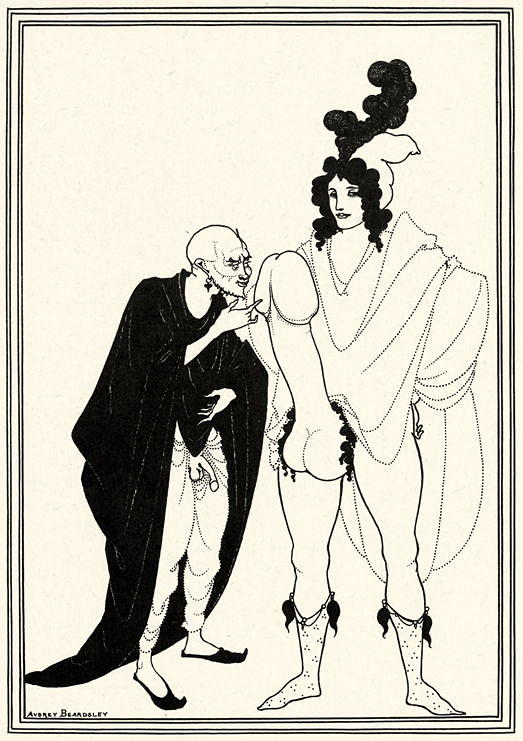 From "Lysistrata" (Click for larger) That same year Beardsley became famous as the art editor of The Yellow Book, a new arts and letters periodical. Although Wilde never actually contributed to the magazine, it was widely assumed to be an organ for the aesthetic ideas that the playwright espoused. Beardsley's stunning black-and-white drawings, title-pages, and covers helped make the new quarterly a great success. But The Yellow Book also quickly became a site of the fin de siècle culture wars, a target of moralists concerned about the influence of the decadent movement on English society and art. One detractor described Beardsley's designs for the periodical as 'Diseased, weird, macabre, and sinister.' In the context of the growing notoriety of Wilde and his circle, this may be seen as an attack on the newly visible homosexual subculture that emerged at the end of the nineteenth century. The culture wars culminated in Wilde's prosecution and conviction for gross indecency in 1895. One casualty of the reaction triggered by the Wilde trials of 1895 was Beardsley himself. He was summarily fired from his job as art editor of The Yellow Book. He had been too closely associated with Wilde for the publisher's comfort and his art too erotic and perverse for the new mood of conformity prompted by Wilde's conviction. Beardsley however continued to find work as an illustrator and created many more beautiful illustrations. Unfortunately, Beardsley had been plagued by ill-health and bouts of tuberculosis since childhood and he died in the South of France, where he had gone in search of a better climate for his increasingly frail health. He was just 25. Considering the brevity of his life, Beardsley's achievement is astonishing. A highly original creator, he transformed the art of illustration and profoundly influenced artists of his own and subsequent generations.
1879 — Henry Hinchliffe Ainley, was an English actor born on this date (d.1945). After education at the church school of St Peter's, Morley, Ainley became a bank clerk in Sheffield, where he took part in amateur dramatics. When the actor-manager George Alexander was on tour in 1899 in H. A. Jones's play The Masqueraders, Ainley obtained his permission to "walk on" (i.e. appear as a non-speaking extra). He made his professional stage début in F. R. Benson's company as a messenger in Macbeth. He remained with Benson for two years, making his London début at the Lyceum Theatre as the Duke of Gloster to Benson's king in Henry V, in a cast that also featured Constance Benson, Leslie Faber, Harcourt Williams, Charles Doran and Oscar Asche. In 1902 Alexander saw Ainley in Benson's production of The Merchant of Venice and engaged him for the juvenile lead role of Paolo in Stephen Phillips's Paolo and Francesca at the St James's Theatre; this propelled him to stardom. After his first Shakespeare roles Ainley returned to Leeds to play at the Grand Theatre. Later roles included Oliver Cromwell, Mark Antony in Julius Caesar and Macbeth himself. He played Malvolio and Leontes under the direction of Granville-Barker and portrayed Hamlet several times, including a 1930 production that was chosen for a Royal Command Performance.
John Gielgud held Ainley in high regard and fulfilled a longstanding ambition to perform with him when Gielgud played Iago opposite Ainley's Othello in a 1932 BBC Radio broadcast. But he described Ainley's Prospero as "disastrous", writing in the Sunday Times in 1996. In 1921, Ainley became a member of the council of the Royal Academy of Dramatic Arts and served as its president from 1931 to 1933. In 1932, Ainley was part of the effort to save the debt-laden Sadler's Wells theatre. He was married three times – to Susanne Sheldon, Elaine Fearon and the novelist Bettina Riddle, who was known as the Baroness von Hutten zum Stolzenberg. He had several children (although the published obituaries in The Times and The Stage disagree as to the precise numbers) which include the actors Henry T. Ainley, Richard Ainley, Anthony Ainley and Patsy Ainley. He was also the father of Henrietta Riddle who was briefly engaged to Alistair Cooke in 1932. Fifteen letters in the possession of Laurence Olivier's widow Joan Plowright suggest that Ainley had a sexual relationship with the younger actor in the late 1930s. The letters – said by Olivier's biographer Terry Coleman to be explicitly homosexual in content – suggest that Ainley was infatuated with Olivier, even if, as some members of Olivier's family insist, notably the actor's son Tarquin Olivier, the feeling was not reciprocated.
1923 – The Los Angeles activist, Don Slater (d.1997), an early leader in the struggle for glbtq rights, was sometimes at odds with others in the movement but never wavered in his devotion to the cause. Slater graduated from Chaffey High School in Capistrano Beach in 1942 and, like many other young men of his age, joined the military in the wake of Pearl Harbor. He was inducted in February 1943 and, because he was already experienced in skiing, was sent to Camp Hale, Colorado for training as a ski trooper. His military service was short-lived, however; a bout of rheumatic fever led to his being discharged in October of the same year. Taking advantage of an Army program that paid his tuition, Slater enrolled at the University of Southern California in February 1944. At around the same time he found the love of his life, Antonio ("Tony") Reyes. The pair met one night in Pershing Square in Los Angeles, where they were both cruising. Decades later, Slater recalled the scene:
"We kept skulking around in the underbrush of the square, and, AAGH!, bumping into each other. 'What! You again!' Finally we couldn't stop laughing, and we decided we must be meant for each other, and we never changed our minds." A short while after getting together with Reyes, Slater brought him home to meet his family, to whom he came out at the same time. His mother and three siblings were dismayed, but his father, despite having converted to Mormonism and becoming deeply religious, was more accepting, saying, "I wish this were not so, but since it is, I'm pleased you have made such a wonderful choice in your partner." He made it clear that Reyes would always be welcome in their home. Thereafter, Reyes was included in all the Slaters' gatherings and, he recalled, was treated "as a member of the family." In his years at USC, Slater became part of the Los Angeles "gay underground," frequenting rather sleazy Main Street bars, where he enjoyed watching drag performers. He was not a particularly diligent student but had nearly completed his degree in English literature in 1948 when he was again stricken with rheumatic fever. He received permission from the Army to postpone his final term. During his time off and after he was on his feet again, Slater traveled extensively—but cheaply—working in the galley of a freighter. When the ship docked, Slater was able to visit port cities throughout Europe. When the voyage was over, Slater returned to college and completed his bachelor's degree, specializing in the Victorian novel. In the early 1950s Slater and Reyes attended several meetings of the Mattachine Society, but, he stated, they were disappointed by the organization and did not join. Instead, they became part of an affiliated group that founded ONE, Incorporated. Among the association's goals, as enumerated in its Articles of Incorporation, were "to publish a magazine dealing primarily with homosexuality from the scientific, historical, and critical point of view, . . . to promote among the general public an interest [in], knowledge and understanding of the problems of variation, . . . [and] to sponsor research and promote the integration into society of persons whose behavior and inclinations vary from current moral and social standards." The Articles were adopted on November 15, 1952 and officially signed by Reyes, Dale Jennings, and Martin Block on behalf of the group. The first issue of ONE Magazine—24 pages long—rolled off the presses in January 1953. Its contents included an article on harassment by police, other news stories, several book notices, a poem, and a letter to readers asking for their support. Before ONE could receive support, it needed to develop a readership base, and since news dealers were reluctant to stock it, ONE members took on the sales job themselves, making the rounds of gay bars and encouraging patrons to spend a quarter for the magazine. Slater later broke away from ONE and started a new magazine Tangents. Although Slater was generally not much given to public demonstrations, on Armed Forces Day, May 21, 1966, he organized a motorcade through Los Angeles and Hollywood in protest of the discriminatory policies of the United States military with respect to homosexuals. Activist Harry Hay and his life partner John Burnside made signs for the cars in the raucous parade. Joseph and Jane Hansen—"with [their] lovers and kids . . . packed into whatever junkyard jalopy [they] owned at the time"—also took part, as did California State University-Northridge professor Vern Bullough, who was working with the ACLU to decriminalize homosexual conduct. The group, recalled Hansen, included "a lot of respectable protesters," among them "clergymen [and] professionals, with respectable cars." Slater was persistent in his quest for justice for gay and lesbian veterans denied honorable discharge and ruled ineligible for pensions. Though rarely successful, he was tireless in supporting gay veterans, some of whom had served valiantly in the fiercest battles of World War II. When the youth movement erupted in the late 1960s, Slater embraced it, festooning the cover of an issue of Tangents with pictures of forty protest buttons advocating glbtq rights. In his editorial Slater optimistically wrote that "these buttons say openly and flatly what yesterday's youngsters only dared whisper . . . . The buttons indicate a change in attitude toward Western sexual hypocrisy by a whole generation." He went on to express the hope that these young people "as mature men and women will make up an America a whole lot less harrowing for homosexuals to live in." Slater was less than impressed with other manifestations of the burgeoning gay rights movement, notably the founding of the Metropolitan Community Church by the Reverend Troy Perry. Slater rejected organized religion for its condemnation of homosexuality and felt that Perry and other people of faith ought to demand changes in policy in their own churches "instead [of] . . . accept[ing] their judgment of us as loathsome monsters, who must creep off and pray with our own kind, forever despised and rejected." Slater had always hoped to use journalism to spark a dialogue between homosexuals and heterosexuals. However, the subscribers to Tangents were overwhelmingly gay, and with the arrival of publications specifically targeted to a gay readership such as The Advocate (originally a bi-weekly tabloid before it emerged as a powerhouse of the gay press), subscriptions to Tangents declined, and eventually the magazine folded. Slater carried on, working at the Homosexual Information Center (HIC) in Los Angeles until a heart ailment forced him into the hospital for a valve implant in 1979. In the process of surgery he became infected with hepatitis B and nearly died. He was able to resume working, but in 1983, upon leaving the HIC office, he was mugged and severely beaten in the parking lot. After a long recovery in the hospital, he and Reyes retired to a cabin in the mountains of Colorado, where they could enjoy time together, surrounded by their beloved pets and the natural beauty of the place. Warned by doctors of the need for further heart surgery but fearing another infection, Slater put off additional medical procedures. He suffered a serious heart attack in December 1996. Too frail to survive another operation, he languished until Valentine's Day 1997, when he died in the loving company of his partner and old friends.
1928 – (James) John Gruber (d.2011) was an American teacher and early LGBT rights activist, an original member of the Mattachine Society, one of the earliest homophile organizations in the United States. James Gruber was born in Des Moines, Iowa. A boy scout at 13, Gruber described himself as a "typical teenager." Growing up he considered himself bisexual and was involved with both men and women. His father, a former vaudevillian turned music teacher, relocated the family to Los Angeles in 1936. Enthralled with the glamour that Hollywood offered, the good-looking young man took acting, music and dancing lessons. Gruber enlisted in the United States Marine Corps in 1946 at the age of 18. In close physical proximity to men for the first time, he "went bananas in the sex department." He enjoyed the camaraderie of his fellow soldiers, even as he continued to have affairs with women. He was honorably discharged in 1949.Using his G.I. Bill benefits, Gruber studied English literature at Occidental College in Los Angeles. In 1950 he met Christopher Isherwood, who was to become a close friend and role model. "Chris was the man I aspired to be." Chris introduced Gruber to W.H. Auden, who was impressed that John had read his work. Chris also introduced Gruber to his landlady, Evelyn Hooker, a therapist and professor of psychiatry at UCLA whose pioneering research on gay men contributed to a change in the attitudes of the psychological community towards homosexuality, leading to the American Psychiatric Association's 1973 decision to remove homosexuality from its handbook of disorders, and an increased acceptance by society at large. Isherwood, working for various Hollywood studios, introduced Gruber into the heady world of Hollywood, inviting him to be his date on opening night of the play I am a Camera, based on his novel The Berlin Stories. He met Jayne Mansfield, who "made me tingle in the swimsuit area," and remembered "watching Marilyn Monroe on a movie set one summer day reading War and Peace hidden behind a propped-up comic book." In April 1951, primarily as a social adventure, Gruber and his boyfriend Konrad "Steve" Stevens became the last new members of the Mattachine Society, then known as the "Society of Fools." John later relived the atmosphere of the meetings, "All of us had known a whole lifetime of not talking, or repression. Just the freedom to open up…really, that's what it was all about. We had found a sense of belonging, of camaraderie, of openness in an atmosphere of tension and distrust. … Such a great deal of it was a social climate. A family feeling came out of it, a nonsexual emphasis. … It was a brand-new idea." John embraced his "newly chosen family," even if he did not fully endorse its Communist underpinnings. Following a conversation with co-founder Harry Hay about Medieval masque troops known as "mattachines", Gruber suggested changing the group's name from "Society of Fools" to Mattachine Society. Gruber often recounted how the sole extant image of the Mattachine founding members came to be. At a Christmas party Gruber, clandestinely holding a camera, nonchalantly walked across the room and midway surreptitiously snapped the photo. Harry Hay heard the click and became incensed, because the meetings were covert and it was extremely dangerous to identify members. James reassured him that there was no film in the camera. The famous photograph features Konrad Stevens, Dale Jennings, Harry Hay, Rudi Gernreich, Bob Hull, Chuck Rowland, Stan Witt, and Paul Bernard. 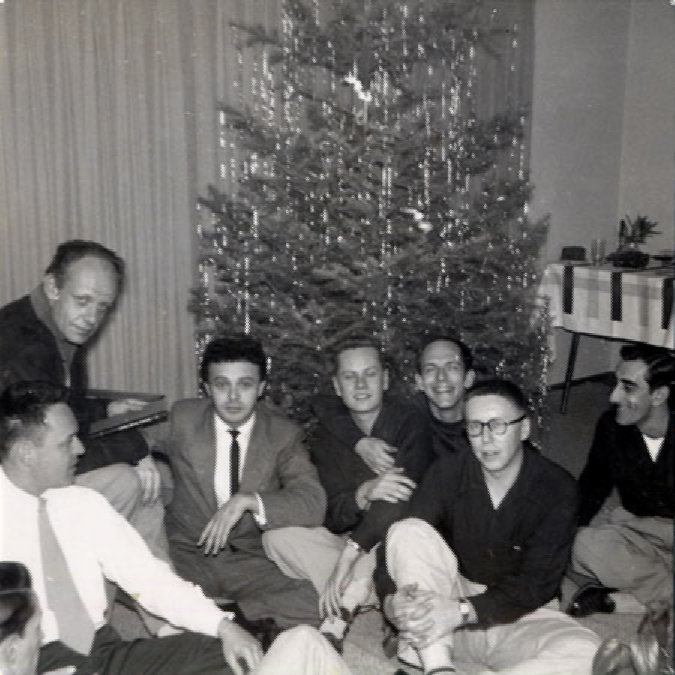 (Click for larger) Growing increasingly disillusioned with life in Los Angeles, Gruber moved to Palo Alto in 1960 and changed his first name to John. He pursued a teaching career at Foothill College and San Francisco State University and also taught or tutored at Cubberly High School, Milpitas High School and de Anza College. Identifying himself as "an unmarried alcoholic bisexual teacher," he met Beth Erickson, who became a lifelong friend, eventually encouraging him to attend his first AA meeting in 1976. Newly sober, he "set out to become a successful novelist like my mentor." In 1984 his battle cry was "God save us from the menace of the Rigid Right and the Religious Wrong." Always deeply contemplative, Gruber maintained, "The relationship you have with your inner self is the most important one of your life." His unpublished manuscript, "The Deviant: an Illustrated Autobiography," chronicles his life across the 20th century year by year, including references to movies, books, songs, newspaper clippings, and images of current events, movie stars, and family photographs. Gruber helped to document the early LGBT movement through interviews with historians, participating in a panel discussion in San Francisco in 2000 commemorating the 50th anniversary of the founding of Mattachine and appearing in the 2001 documentary film Hope Along the Wind about the life of Harry Hay. Gruber suffered increasingly ill health for several years before his death on February 27, 2011, at his home in Santa Clara.
1935 – Playwright Mart Crowley saw his first play, The Boys in the Band, become a huge off-Broadway hit that was later adapted as a motion picture. Although a groundbreaking representation of gay men, The Boys in the Band is now considered somewhat controversial, partly for the attitudes of the characters and partly for its now anachronistic setting in the age before AIDS. Crowley is a son of the South. Born in Vicksburg, Mississippi on August 21, 1935, he used his familiarity with the culture and his personal experience to inform his writing. Crowley's childhood was not a happy one. His father, a tavern-keeper, was an alcoholic, and his mother, who was addicted to both drugs and alcohol, eventually had to spend considerable time in mental institutions. For a respite from his miserable home life, the young Crowley frequented the local movie theater. After graduating from a Catholic boys' high school in Vicksburg, Crowley enrolled at Catholic University in Washington, D. C. When he received his degree in theater in 1957, he went to New York, where he became a production assistant to director Elia Kazan on the film Splendor in the Grass, based on the play by William Inge. Crowley became friends with the film's star, Natalie Wood, who encouraged him to go to Hollywood to pursue a career in screenwriting. Crowley succeeded in writing a script that was slated for production, but the project was cancelled at the last moment. Other disappointments followed. Crowley wrote the pilot episode for a television series that was to star Bette Davis, but the show was never produced. Next he got a screenwriting job at Paramount, but was soon fired. After these setbacks Crowley was house-sitting for a friend when he wrote a play about a group of gay men. A friend brought the work to the attention of producer Richard Barr, who ran the Playwrights' Unit with Edward Albee. They agreed to put it on in a workshop in January 1968, and Crowley burst onto the literary scene with his best-known work, The Boys in the Band. It opened off-Broadway in April and ran for over a thousand performances. The play was made into a film directed by William Friedkin in 1970.  The Boys in the Band is a groundbreaking work that uses both humor and melodrama to offer a look at the lives of a group of openly gay men. Queer audiences welcomed it when it appeared, but over the years it became controversial. Objections centered on traits of various characters that critics felt perpetuated negative stereotypes—self-loathing, flamboyance, and promiscuity. Rather than offering an upbeat, positive look at the gay subculture, it presented a depressing snapshot of individuals tormented by internalized homophobia. Set at a birthday party in New York, The Boys in the Band introduced audiences to a number of gay men with different attitudes and backgrounds. The birthday celebrant is Jewish, one of the guests African-American. Another guest is thoroughly campy and brings a hustler dressed as a cowboy as a birthday gift. The guests also include a couple, one of whom is a divorced father of three. The pair, though committed to each other, are arguing over whether their relationship needs to be exclusive. At the center of the piece is the host, Michael, the character with whom Crowley most strongly identifies. The cynical and pessimistic Michael has been the focus of many who became detractors of the play in later years. His most famous line, "You show me a happy homosexual, and I'll show you a gay corpse," has often been quoted to indicate the character's self-loathing, and sometimes to indict Crowley for his negative depiction of the period's gay subculture. Crowley, however, has strongly defended his play, calling it a period piece—from an era before both Stonewall and the AIDS epidemic. He stated in 1996 that the play's "self-deprecating humor was born out of a low self-esteem, if you will; from a sense of what the times told you about yourself." He said that he understood "the need for positive images" and pointed out that "the lovers in the play, Hank and Larry, make a most positive statement about commitment to each other" at the end of the piece. He also called the "flaming and incendiary" character Emory "very positive" because "he never hides who he is, and that's a very brave thing to do." Certainly, it is true that even today it is difficult for glbtq people to grow up in America without internalizing the homophobic attitudes of the larger society. That would have been even more true for the characters in Crowley's play, most of whom grew up in the 1950s, a decade in which homosexuals were routinely abused and their self-esteem systematically attacked. Rather than dismissed for presenting a politically incorrect view of gay men, The Boys in the Band should be respected for calling attention to the destructive effects of the pervasive societal homophobia with which gay people in the period before Stonewall had to cope. During the 1970s Crowley lived off his money from The Boys in the Band. He stated in 1996 that he "was just running around the world, drinking too much" at the time, and so his funds were dwindling by the end of the decade. In 1979 Crowley's friend Natalie Wood and her husband, Robert Wagner, helped Crowley get a job as head writer for the television show in which they starred, Hart to Hart. When the producer abruptly quit, Crowley replaced him and remained in that post until 1983. Crowley then returned to work as a screenwriter. "I have original movie scripts in the files of every major studio in Hollywood," he declared in 1993. Although he was successful in selling them, none has ever been produced. Crowley's stage play, For Reasons That Remain Unclear, dealt with the theme of sexual abuse of a student by a Catholic priest. Crowley has stated that the story is a fictionalized version of his own experience. The play was first presented at the Olney Theatre in Maryland. It was optioned for a year, but the production was soon abandoned. The play has since been performed in a few regional theaters. The Boys in the Band was revived in New York in 1996 to mostly favorable reviews and had a respectable run. By the time of the revival Crowley had already let it be known that he was planning a sequel. It was not until 2002, however, that The Men from the Boys premiered in San Francisco. The setting for the sequel is the same New York City apartment that was the site of the birthday party in The Boys in the Band. This time it is the venue for a wake for Larry, who has died of pancreatic cancer. Seven of the nine original characters return, and three younger ones have been added. While reviewers generally found the play entertaining and pointed to some wickedly witty lines by Crowley, they were somewhat disappointed by the lack of evolution of the characters. Critic Dennis Harvey commented that they "end up defined mostly by the degree to which they've resisted 35 years of social and potential personal change." While Crowley has never been able to recapture the success and acclaim that he had with his debut play, he deserves honor for having blazed the trail for subsequent gay-themed theater with The Boys in the Band.
1946 – Steve Berman (d.1983) was an active worker for Gay rights in Southern California in the 1970s. Steven Phillip Berman was born in Illinois and grew up in the greater Chicago area. After graduation from high school, Berman obtained a B.A. in psychology from the University of Illinois at Champaign-Urbana in 1970. Relocating later that year, Berman began work on his M.A. in psychology at California State University, Long Beach. While at CSULB, Berman founded the Gay Students Union and the Gay Students Council of Southern California, often speaking at local colleges and universities. As a graduate student, Berman focused his studies on personality and ability testing, working with prominent lesbian psychologist Betty Berzon. In 1973, prior to completion of his degree, Berman underwent neurosurgery for removal of an arteriovenous malformation. This surgery left Berman with seizures and other neurological conditions that would plague him the rest of his life. During his schooling and for some time after, Berman worked for several Southern California agencies involved with general mental health and gay support services, including the newly founded Gay and Lesbian Community Services Center where he worked with parolees reentering the workforce. Berman moved to the San Francisco Bay area around 1981, continuing his social services work and becoming increasingly involved with Jewish organizations and congregations. As a member of Jews for Social Responsibility and later the Jewish Coalition for Lesbian and Gay Rights, Berman lobbied the San Francisco community for increased awareness of Middle East conflicts and for greater rights for lesbians and gays in the Bay Area. Berman’s most notable work was as a case manager for North of Market Multipurpose Senior Services in the early 1980s. Berman worked with gay seniors, frequently referencing them to gay and lesbian organizations in the area for specialized attention and support. He also worked with San Francisco City Hall to clarify policy for city employees, seeking (and winning) grievance rights for same-sex partners of city and county employees. Berman died on July 17, 1983, collapsing after completing a race to raise funds for HIV/AIDS research.
1962 – The adult porn "actor" Jeff Stryker , who has starred in bisexual, gay, and straight adult films, was born on this date. Born Charles Casper Peyton in Carmi, Illinois, he currently lives in California. Jeff Stryker is primarily known as a performer in gay pornography films, although Jamie Loves Jeff was one of the biggest selling heterosexual adult movies of all time for its producer, Vivid Entertainment. He describes himself (in a somewhat joking fashion) as sexually "universal". He has also said, "I don't define myself as anything." He also tried his hand at other acting, starring in a 1989 Italian-produced horror movie called After Death (Revenge of the Zombies), in which he was credited as Chuck Peyton, and was seen in other movies such as Can I Be Your Bratwurst Please? and Dirty Love. 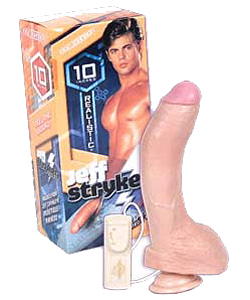 The "Jeff Stryker Cock and Balls," a dildo fashioned from a cast of his penis, is widely sold in sex stores. The sex toy was billed as the "first dildo ever manufactured using an exact mold of a celebrity's body part", and reportedly is the best selling item of its kind. A licensed line of Jeff Stryker products is available: calendars, playing cards, T-shirts, greeting cards, Stryker Lube and the Jeff Stryker Action Figure (below). 
1964 – Today is the birthday of American born Israeli film director Eytan Fox. He is openly gay and many of his films contain themes of homosexuality, as well as the effect the Israeli-Palestinian conflict has on interpersonal relationships. At the age of two he emigrated with his parents to Israel and studied at Tel Aviv University's School of Film and Television. His films include Shirat Ha'Sirena (1994), Ba'al Ba'al Lev (1997), Yossi & Jagger (2002), and Walk on Water (2005). 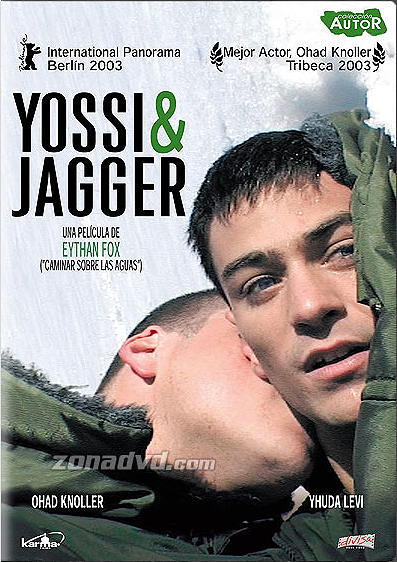 His film, the brilliant and moving The Bubble (2006) was about a Gay love story between an Israeli and a Palestinian. Yossi (2012), Fox's fifth feature film, is a sequel to the director's breakthrough work Yossi & Jagger. The plot takes place a decade after the events in that previous film. It follows the title character, a closeted gay cardiologist who struggles to find meaning in his life while overcoming the loss of his lover and reconciling his past with his future. He and his partner, Gal Uchovsky, have been together for over 18 years. They are also professional collaborators, Uchovsky, a writer and journalist, is involved in much of the scriptwriting for Fox's movies.
1966 – Kenneth Mehlman is an American businessman, attorney, and political figure who served as the campaign manager for the 2004 re-election campaign of George W. Bush and Chairman of the Republican National Committee from 2005 to 2007. In 2007, President Bush appointed Mehlman to the U.S. Holocaust Memorial Council. On August 26, 2010, Mehlman came out as gay, making him one of the most prominent openly gay figures in the Republican Party. Prior to this revelation, rumors about Mehlman's sexual orientation had circulated since at least 2004. In May 2006, Mehlman denied that he was gay, telling the New York Daily News, "I'm not gay, but those stories did a number on my dating life for six months." On November 8, 2006, comedian Bill Maher made an appearance on CNN's Larry King Live, during which he referred to Mehlman as a closeted gay man. The incident became controversial because CNN edited out Maher's comments in later taped editions and removed the reference to Mehlman's sexual orientation from the transcript of the show. The day after Maher's comments, Mehlman announced he would step down as chairman of the RNC (although reports said that his resignation had been expected for some time). Almost four years later, in an article in The Atlantic, Mehlman stated that he is in fact gay, and that he plans to be an advocate for legalizing same-sex marriage. According to the New York Times, Mehlman's "announcement makes him apparently the most prominent Republican official to come out." This disclosure followed years of him avoiding and denying inquiries about his sexual orientation. During his RNC chairmanship, Mehlman supported social positions of the Republican Party, including opposition to same-sex marriage. Mehlman claimed that he could not have gone against party consensus, but acknowledged that, had he come out of the closet earlier, he could have impacted Republican efforts to pass state initiatives and referenda banning same-sex marriage. A few commentators criticized Mehlman for remaining closeted about his sexuality, with personalities such as Cenk Uygur and Michael Rogers (the latter of whom has long advocated for the forced outing of closeted gay politicians who vote or advocate against LGBT interests) both condemning and rejecting his request for sympathy on MSNBC's The Ed Show. Other members of the LGBT community have expressed support for Mehlman. Dustin Lance Black, the Academy Award winning writer of Milk, said, "Ken represents an incredible coup for the American Foundation for Equal Rights ... As a victorious former presidential campaign manager and head of the Republican Party, Ken has the proven experience and expertise to help us communicate with people across each of the 50 states." Stephen Petrow, former president of the National Lesbian & Gay Journalists Association, wrote in a Huffington Post column, "... the 43-year old Mehlman found the courage to be honest about his identity with family, friends, former colleagues and current colleagues [who have] been wonderful and supportive." Gay & Lesbian Victory Fund President and CEO Chuck Wolfe said in a public statement, "We hope the fact that Ken Mehlman has reached this level of honesty will now encourage other political leaders to reject divisive anti-gay campaign tactics...
1970 – On this date Huey Newton, the leader of the Black Panthers, publicly stated his "solidarity" with the "Gay Power" movement in a speech where he said, "a person should have the freedom to use his body in whatever way he wants."
1984 – Robin de Jesús is an American film and theater actor of Puerto Rican descent. He has received Tony Award nominations for his roles in In the Heights, La Cage aux Folles, and The Boys in the Band. His first major role was as Michael in the independent film Camp (2003), where he plays a gay teen who gets beat up for wearing drag to his prom. While the film went relatively unnoticed in the mainstream, it gained a cult following among musical theater fans and teens who connected to the outcast theme. He is perhaps best known for playing the role of Sonny in the 2008 Broadway musical In the Heights, for which he received a Tony Award nomination for Best Featured Actor in a Musical. In 2010, he joined the revival cast of La Cage aux Folles as Jacob, the sassy housekeeper, which earned him his second Tony Award nomination in the Featured Actor category. De Jesús played the role of Boq in the Broadway production of Wicked at the Gershwin Theatre. In 2019, he received a third Tony Award nomination, for Best Featured Actor in a Play, for his role of Emory in The Boys in the Band. He recreated the role for the 2020 film adaptation produced for Netflix. In 2021, Jesús played Michael in the musical drama tick, tick... BOOM!. Robin is gay and speaks to young audiences about fully accepting oneself.
2009 – on this date the Evangelical Lutheran Church voted to allow individual congregations to bless same-sex marriages. The ELCA is the largest sect of their denomination with 4.7M members at 10,000 churches. The move was opposed by other Lutheran sects and may further splinter the denomination.
2002 – Twenty lesbian and gay survivors whose partners died in the September 11 terrorist attacks on the World Trade Center were told they would receive workers’ compensation under a new state law.
2004 – A Louisiana state judge rules that the proposed constitutional amendment banning same-sex marriages and civil unions was unconstitutional and must be taken off the September 18 ballot.
|
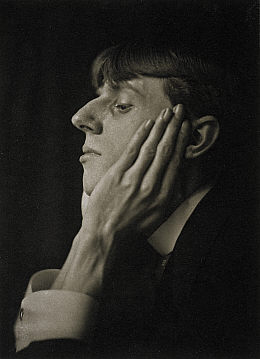
 Added 2025
Added 2025
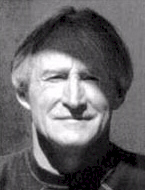
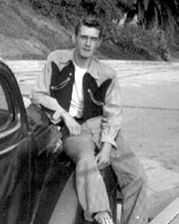
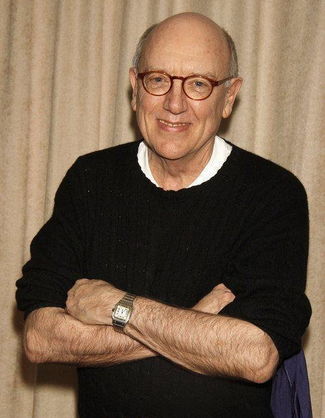
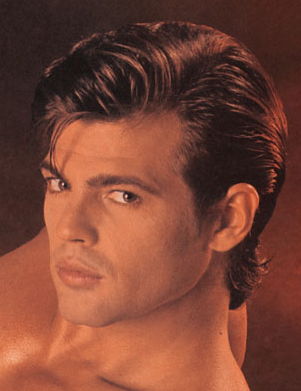
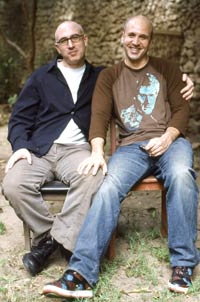 Eytan Fox with Gal Uchovsky.
Eytan Fox with Gal Uchovsky.